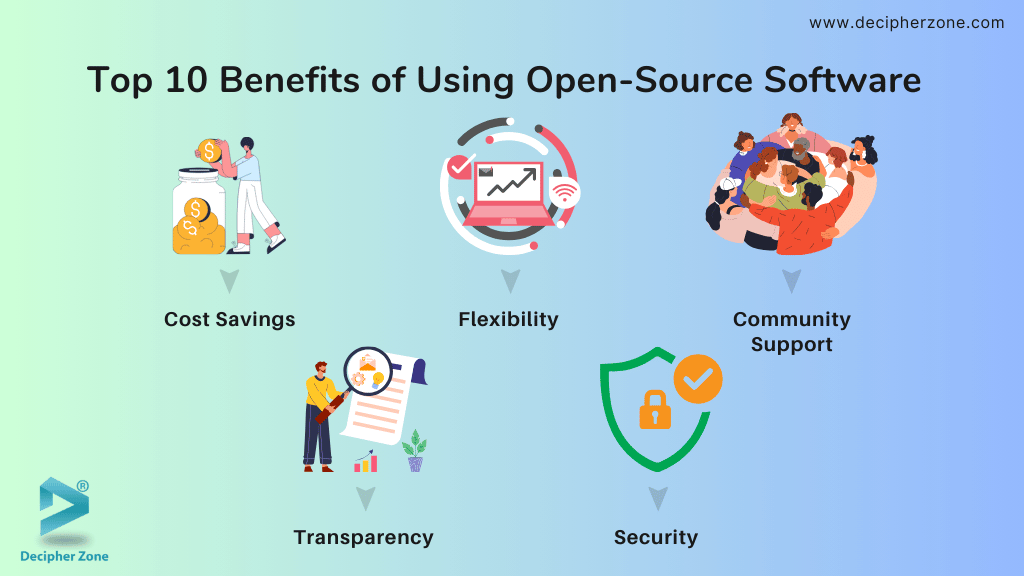Quick Summary: Elevate your software using open-source software, this blog guides you to the top benefits of open-source software for developers, and how it contributes to enhancing the quality of software solutions. Open-source software allows developers to access, modify, and use the code which can uplift the quality of the software while often being free to use.
When we think about open source software, we often first notice that there are no fees or extra charges for using it—an important benefit of using it for small businesses and startups on a tight budget.
Introduction to Open-Source Software
Open source software offers much more than cost-savings, it provides better code quality. With the source code available for anyone to see, a community of developers can work together to improve it which makes the applications more reliable.
Security is another important benefit where many contribute quickly, to find, and fix vulnerabilities. This often leads to a safer software development environment.
Open-source software development can give businesses a competitive edge by offering flexibility, adaptability to technologies, innovation, teamwork, collaboration, and drive growth.
This blog is curated keeping in mind all the businesses and how businesses can leverage the top benefits of open-source software for developers and even why use open-source software in development.
These valuable benefits can improve the operations and success that you won’t wish to miss, and answer “how to improve software development with open-source tools”.
The journey our developers share into the world of open-source has provided us with invaluable experiences that have driven us to effective reasons why businesses should go for open source software.
Top 10 Benefits of Using Open-Source Software for Development Projects
Here is the list of advantages that open open-source software solutions that explain the value of open source with organizational frameworks:

1. Cost Savings
Many businesses using Software as a Service (SaaS) struggle with high subscription fees. These costs can increase as the company grows and needs more users or features.
-
Open-source software is free to use while including some costs for the additional features and hosting.
-
It helps businesses save money on IT without worrying about sudden price increases.
-
It also allows businesses to customize and expand the software at no extra cost which makes it a smart choice for businesses of all sizes.
2. Flexibility
Flexibility is essential for providing solutions to the teams and adapting to the tailored project requirements to meet client needs.
-
Open source software allows to customize, unlike SaaS solutions that limit changes.
-
It has the ability to modify the code tailored to your unique needs. This flexibility not only allows businesses to enhance existing features but also to add new ones.
-
This ensures that the software aligns perfectly with their operational goals.
-
For example, businesses can integrate extra functionality to their existing software solutions without waiting for anyone’s update which provides a competitive edge and makes it easier to stay agile in business operations effectively.
3. Community Support
Open-source software evolves based on the needs and contributions of its extensive community of developers who actively contribute to its evolution.
-
This community-driven development means your software can adapt more readily and it offers valuable support in identifying and resolving bugs.
-
This enhances the software’s overall quality and the community members are dedicated to providing assistance and continually contributing to the software’s ongoing development and improvement.
-
Support options can differ depending on the specific project but it commonly includes a variety of resources.
-
Many users find assistance through dedicated online forums where they can ask questions and receive answers from both peers and experts.
4. Transparency
Open source software provides transparency and allows all code changes to be visible to the public.
-
The openness boosts greater trust and accountability within the development community.
-
For example, take SuiteCRM, an open-source customer relationship management system that shares its development roadmap and actively seeks feedback from its user community.
-
Users can inspect the code themselves which builds a stronger sense of trust in the software.
-
The public nature of the code reassures users about the reliability of the software which makes it well-suited for long-term projects as these reduced worry about the software being suddenly discontinued.
5. Security
Open-source software can often be more secure than any software because anyone can review its source code, making it less likely to be risky. This openness helps find and fix vulnerabilities quickly.
-
One example of this is ModSecuiryt, an open source web applications firewall. It is known for its strong security features and is widely used by businesses to protect their web applications.
-
The community of developers can quickly spot issues or vulnerabilities.
-
This leads to fast patches and in many cases makes ModSecurity even more secure than closed-source alternatives.
6. High-Quality Code
Open source software often achieves high quality because of the diligent standards and best practices followed by its vibrant community of contributors.
-
Developers from diverse backgrounds collaborate to extensively examine code, engaging in peer reviews, and thorough testing processes.
-
This collective effort ensures that any bugs or inefficiencies are swiftly identified and addressed.
-
Boosting an environment of constant scrutiny and improvement that results in highly reliable and efficient code.
-
For example, any open source platform signifies this commitment to quality by implementing rigid coding standards, which are upheld through careful code reviews and detailed testing protocols which ultimately leads to a powerful software project.
.avif)
7. Scalability
One of the standout benefits of open source software is its unparalleled scalability. Whether you are a startup launching your first MVP or a business managing millions of users, open source software solutions grow with you.
-
With access to the source code, open source software allows developers to optimize performance, customize features, and integrate with cloud-native tools to handle increasing workloads.
-
These frameworks like Kubernetes or databases like PostgreSQL are the best job that can fine-tune configurations to maximize efficiency.
-
It evolves alongside the tailored architecture, empowering developers to focus on building scalable, robust applications that meet the demands of future users.
8. Collaboration
Open source software thrives on collaboration, not just among developers but also across systems.
-
Its ability to work well with various tools and platforms makes it great for businesses that use a mix of technologies.
-
It helps in communicating easily whether you are connecting APIs, syncing databases, or creating workflows between applications.
-
Open standards and clear protocols allow tools to work together smoothly. By using open-source collaboration, improving productivity, simplifying operations, and making it easier to manage different systems.
9. Skill Development
Open source software offers a wide range of tools, technologies, programming languages, and frameworks.
-
This allows developers to enjoy working on and with open source projects, giving them a learning environment.
-
This learning environment allows developers to learn best coding practices and programming standards from well-established software solutions that are free.
-
Trying out different technologies and methods they might not use in daily work helps them build their skills.
-
Working with experienced developers on open source projects exposes programmers to new ideas and techniques.
-
This collaboration helps them learn and grow in their abilities.
10. Development Speed
Open source software speeds up development with many ready-made libraries, frameworks, and tools available. Developers can skip repetitive tasks and focus on creating important features.
-
The team of thousands of developers around the world constantly improves, fixes, and innovates on shared code which shortens the time it takes to create new ideas.
-
If you need a new feature, someone might already be working on it, or you can easily build on what’s already there.
-
This quick and community-driven approach helps developers finish projects faster, meet tight deadlines, and maintain quality.
Final Thoughts: Why Businesses Should Leverage Open-Source Software
Keep your business's unique needs and long-term first when choosing between a SaaS platform and open-source software. Imagine a world where your ideas aren’t limited by any restrictions or budgets.
Open source software offers you that freedom by encouraging experimentation, boosting creativity, and transforming obstacles into opportunities. Open source software is not just a cheaper option but a transformation for your business.
Engage with this active community and see how open source software can change your development process.

Build your confidence in open source software with the support of our skilled and experienced team of developers at Decipher Zone. Our talented professionals are equipped with the latest knowledge and techniques to help you create exceptional software solutions tailored to your business needs.
Partner with us to employ the power of open-source innovation and transform your ideas into superior software that stands out in the competitive market.
FAQs on Open-Source Software Development
-
Can open-source software be modified and redistributed?
Yes, open source software can be modified and redistributed, as the core concept of open source is that source code is freely accessible, allowing users to change and share the software with others.
-
Open-Source Software vs Proprietary Software?
Open-source software allows developers to modify, distribute, and customize it freely. It’s typically cost-effective, community-driven, and adaptable, making it ideal for innovation and flexibility. While Proprietary software is owned by an organization and comes with restrictive licenses, updates, or additional features.
-
What are Open Source Software benefits?
Open source software offers a wide range of benefits like cost savings, greater flexibility, robust community support, enhanced security, access to high-quality code, and more.
Author Profile: Mahipal Nehra is the Marketing Manager at Decipher Zone Technologies, specializing in content strategy, and tech-driven marketing for software development and digital transformation.

